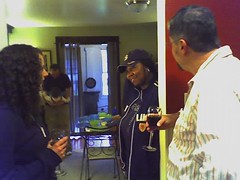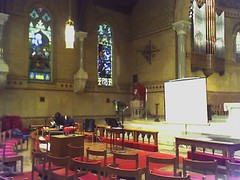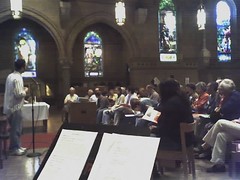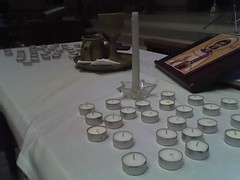episcopal and emergent, part 1 -- via media
I've sometimes been asked why we are an Episcopal community. Many emergent experiments, especially in the U.S., have chosen to go it alone as independent churches. So, why is it important to us to be linked to a tradition and specifically to the Anglican tradition?
(For those of you who don't know, the Episcopal Church USA is the U.S. branch of the worldwide Anglican Communion--having a spiritual link to all the churches that have emerged from the Church of England and maintain a tie to one another through the spiritual leadership of the Archbishop of Canterbury.)
The truth is, we have people in our community who come from Methodist, Baptist, Catholic, Presbyterian, and Episcopal backgrounds. So to what extent does being part of the Anglican tradition make a difference to who we are as Peacemeal?
In short, I believe we are Anglican just to the extent that the Anglican tribe provides a hopeful and helpful band of fellow travelers as we seek to follow God in the way of Jesus. In this tribe we have both a link to the past and permission to explore the future. As the Church of England community, mayBe, puts it on their website:
"The bible is the text that forms us. We are nourished by Jesus's meal - the Eucharist. We are part of the Church of England. And we stand in the tradition of our brother and sister Christians down the centuries and around the world. It's this grounding that gives us confidence to explore. With these roots down, our walls can come down."Scripture, eucharist, and the tradition together create strong enough roots that we can experiment with confidence that we will not lose our center.
In this and a series of posts to come, I will explore different aspects of Anglican identity that help us live as a faithful, missional community in today's culture.
The first aspect I would emphasize is that the Anglican tradition has always been a "via media" tradition. "Via media" is Latin for "middle way" (or, as I prefer, "third way"--since sometimes the way out of a polarized situation is not to walk down the middle but to walk off the map).
This characteristic goes back to the beginning of the Church of England, when it attempted to find a middle ground between the Medieval Catholic church and the Reformation churches springing up on the European continent. It wanted to keep many of the spiritual and liturgical traditions of the medieval church while taking up much of the theology of the Reformation. You might say the Church of England was trying to be "ancient-future" before ancient-future was cool. In practice this meant that the Church of England left room for many varying theological perspectives within its churches. What united the people was common prayer. By worshipping the same God in the same way we had a unity that did not depend on perfect theological agreement.
For instance, unlike either the Reformation churches or the Catholic church, the Church of England allowed Christians to share in communion at the Lord's Table even if they did not agree on whether (or how) Christ was really present in the bread and wine. The most important thing was that we all shared the sacrament as a way of communing with Jesus and with one another, not that we held exactly the same belief about the elements themselves.
This desire to find the "via media" makes the Anglican Communion a natural place to live out an emerging church experiment. In the emergent conversation we tend to want to find the third way beyond the givens of the modern church: liberal/conservative, traditonal/contemporary, red state/blue state, etc. We're not happy joining either side or writing off either side. We want to embrace the best wisdom of each but move along a third path that does not allow the kingdom to be captured by cultural or political agendas.
In Peacemeal we are trying to embrace the third way of the kingdom and as we do that we draw guidance and inspiration from a Episcopal tradition that has always believed there is a way between (or above) the given options.

| episcopal, emerging church, emergent, via media, third way |









